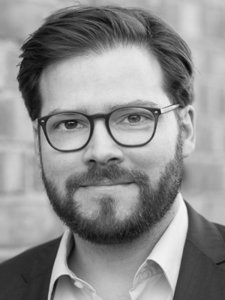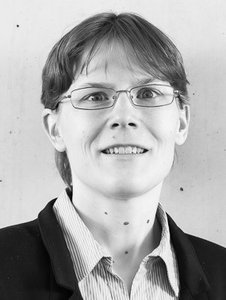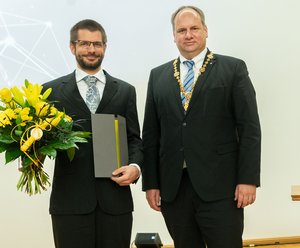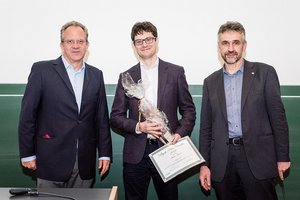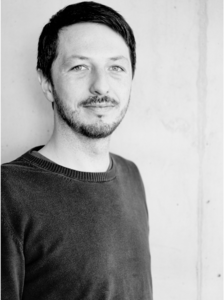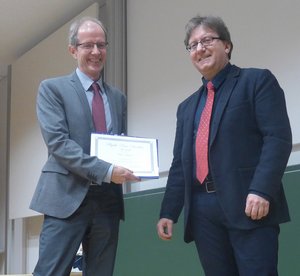
Highlights
Awards and Honors
ERC Starting grant for Christoph Weber
The European Research Council (ERC) has selected 436 early-career top researchers from 40 nationalities across Europe in the 2020 'Starting Grant' competition. The prestigious grants enable the best young researchers in Europe to build their own teams and to conduct pioneering research across all disciplines. Among the awardees is Christoph Weber, research group leader at the MPI-PKS and the Center for Systems Biology Dresden. With his project „FuelledLife”, Christoph and his group want to understand how living cells regulate phase separation and to unveil the role of phase separation for the emergence of life.
"Living cells rely on the compartmentalisation of thousands of different molecules and their chemical reactions,” Christoph explains. “Remarkably, many of such compartments form by phase separation of polymers and are controlled by sequence-specific interactions but also cellular fuel driving the system away from thermodynamic equilibrium. If we knew how such polymers evolve in time and compartmentalise in multi-component mixtures, we would better understand the role of phase separation in living cells and how prebiotic cells could have emerged at the origin of life.
My team and I will develop a theory for phase separation and chemical reactions in multi-component mixtures that are driven by irreversible, fuel-driven reactions. Our theoretical studies will let us understand how living cells regulate phase separation at the origin of life and determine the prerequisites of a protocell to divide, replicate and undergo selection."
Christoph will receive 1.5 million Euros over a period of five years. Congratulations to the Weber group!
Read moreAwards and Honors
European funding to unravel scientific mysteries
Steffen Rulands receives ERC Starting Grant
The prestigious ERC starting grants allow the best young researchers in Europe to build their
own teams and to conduct pioneering research across all disciplines. Among this year’s
awardees is Steffen Rulands, research group leader at the Max Planck Institute for the
Physics of Complex Systems, and the Center for Systems Biology Dresden! With the
interdisciplinary project “AHH-OMICS” Steffen and his group aim to apply theoretical
methods originally developed in the physics of solids to understand the mechanisms
underlying the behaviour of cells during development, regeneration and ageing.
Steffen explains, “The recent breakthroughs of single-cell sequencing technologies for the
first time give us the opportunity to probe the inner life of cells with unprecedented
molecular detail. Biological function, however, relies on how many molecules work together
in space and time, which up to now cannot be inferred from these experiments.” The
theoretical physicist continues, “It’s like a car, where from detailed knowledge of all car
parts we still cannot understand how an engine works. We need methods from statistical
physics to do that! The same holds true for the cell – from detailed measurements of
molecules we don’t learn about biological function. The theoretical tools that will be
developed in my project will bridge this gap.”
The ERC project will combine the novel single-cell technologies with methods from
statistical and solid-state physics to understand collective processes regulating cellular
behaviour. With this conceptually new approach the Rulands group will overcome existing
limitations in an emerging technology and pioneer the application of methods from
statistical physics to single-cell genomics.
Steffen Rulands will receive 1.5 million Euros from the ERC over a period of five years. The
European Research Council (ERC) has selected 436 early-career top researchers from 40
nationalities across Europe in their 2020 'Starting Grant' competition. The funding, worth in
total €677 million, is part of the EU’s Research and Innovation programme, Horizon 2020.
Congratulations to the Rulands group!
Read moreAwards and Honors
Anne E. B. Nielsen receives the H.C. Ørsted Research Talent Prize 2020
The H.C. Ørsted Prize and the two H.C. Ørsted Research Talent Prizes are awarded annually to celebrate the Danish physicist and chemist Hans Christian Ørsted's influence on culture, art, thinkers, and scientists all over the world. The prizes are awarded by the H.C. Ørsted Association and Langeland municipality with support from the energy company Ørsted. H.C. Ørsted discovered in 1820 that an electric current produces a magnetic field, and to celebrate the 200 years anniversary of this influential discovery, the prizes are this year awarded to scientists, whose research is related to electromagnetism and its applications in a broad sense. Anne E. B. Nielsen receives the H.C. Ørsted Research Talent Prize, which is donated with a diploma and 10,000 Danish kroner, for her many innovative contributions to the fields of anyon research and quantum light, where she investigates possibilities that arise by combining quantum mechanics and electromagnetism. The prize ceremony took place on H.C. Ørsted's birthday on August 14 in Rudkøbing on the Danish island Langeland, where H.C. Ørsted grew up.
Read moreAwards and Honors
Dresden Excellence Award 2019
Stadt Dresden zeichnet zum dritten Mal herausragende Abschlussarbeiten mit dem Wissenschaftspreis aus.
Am Sonnabend, 29. Februar 2020, vergibt die Landeshauptstadt Dresden gemeinsam mit dem Netzwerk „Dresden – Stadt der Wissenschaften“ den mit 30 000 Euro dotierten DRESDEN EXCELLENCE AWARD. „Mit dem Wissenschaftspreis der Stadt Dresden zeichnen wir als Stadtverwaltung zum dritten Mal in Folge vier Absolventinnen und Absolventen Dresdner Hochschulen für ihre hervorragenden wissenschaftlichen Abschlussarbeiten aus. Diese Würdigung stärkt die Wahrnehmung Dresdens als exzellenten Wissenschaftsstandort“, sagt Oberbürgermeister Dirk Hilbert, der zugleich als Vorsitzender der Jury wirkte.
Ausgezeichnet werden in jedem Jahr vier eingereichte Arbeiten, die besondere Relevanz und Zukunftsorientierung für die Dresdner Stadtentwicklung und Stadtgesellschaft vorweisen.
Die mit 12 000 Euro dotierte Auszeichnung in der Kategorie Habilitation geht an Dr. habil. Sebastian Wüster für seine Habilitationsschrift „Quantentransport in ultrakalten Rydberg Aggregaten“. Die Forschung in der theoretischen Physik untersucht die Anwendung von kalten Rydberg Aggregaten auf in der Quantensimulation relevante Transportprozesse. Dr. Wüster publizierte im Rahmen seiner Habilitation 15 wissenschaftliche Arbeiten, darunter einen Review Artikel und sechs Physical Review Letters. Mit dieser Leistung wird Dr. Wüster als internationaler Experte ultrakalter Rydbergphysik wahrgenommen und ist zunächst auf eine Assistenzprofessur in Ankara/Türkei und schließlich als Assoziierter Professor an das Indian Institute for Science, Education and Research Bhopal/Indien berufen worden. Damit setzt Dr. Wüster nun mit seiner eigenen Forschungsgruppe international die Dresdner Forschung in der theoretischen Physik auf höchstem wissenschaftlichen Niveau fort.
Read moreAm Sonnabend, 29. Februar 2020, vergibt die Landeshauptstadt Dresden gemeinsam mit dem Netzwerk „Dresden – Stadt der Wissenschaften“ den mit 30 000 Euro dotierten DRESDEN EXCELLENCE AWARD. „Mit dem Wissenschaftspreis der Stadt Dresden zeichnen wir als Stadtverwaltung zum dritten Mal in Folge vier Absolventinnen und Absolventen Dresdner Hochschulen für ihre hervorragenden wissenschaftlichen Abschlussarbeiten aus. Diese Würdigung stärkt die Wahrnehmung Dresdens als exzellenten Wissenschaftsstandort“, sagt Oberbürgermeister Dirk Hilbert, der zugleich als Vorsitzender der Jury wirkte.
Ausgezeichnet werden in jedem Jahr vier eingereichte Arbeiten, die besondere Relevanz und Zukunftsorientierung für die Dresdner Stadtentwicklung und Stadtgesellschaft vorweisen.
Die mit 12 000 Euro dotierte Auszeichnung in der Kategorie Habilitation geht an Dr. habil. Sebastian Wüster für seine Habilitationsschrift „Quantentransport in ultrakalten Rydberg Aggregaten“. Die Forschung in der theoretischen Physik untersucht die Anwendung von kalten Rydberg Aggregaten auf in der Quantensimulation relevante Transportprozesse. Dr. Wüster publizierte im Rahmen seiner Habilitation 15 wissenschaftliche Arbeiten, darunter einen Review Artikel und sechs Physical Review Letters. Mit dieser Leistung wird Dr. Wüster als internationaler Experte ultrakalter Rydbergphysik wahrgenommen und ist zunächst auf eine Assistenzprofessur in Ankara/Türkei und schließlich als Assoziierter Professor an das Indian Institute for Science, Education and Research Bhopal/Indien berufen worden. Damit setzt Dr. Wüster nun mit seiner eigenen Forschungsgruppe international die Dresdner Forschung in der theoretischen Physik auf höchstem wissenschaftlichen Niveau fort.
Awards and Honors
Physik-Preis Dresden
Am 14. Januar 2020 wird der Physik-Preis Dresden des Max-Planck-Instituts für Physik komplexer Systeme (MPI-PKS) und der TU Dresden an Dr. Adam Nahum von der Oxford University vergeben. Die Preisverleihung findet ab 16 Uhr im Rahmen eines Festkolloquiums im Recknagel-Bau der TU Dresden statt.
Adam Nahum hat in seiner noch jungen wissenschaftlichen Laufbahn bereits eine Reihe exzellenter und vielbeachteter Beiträge geleistet. Besonders kennzeichnend für ihn ist seine herausragende Fähigkeit, Konzepte aus verschiedenen Bereichen der theoretischen Physik zu einem universellen Verständnis des Verhaltens komplexer Systeme zu verbinden und so tiefe Einsichten zu erhalten.
„Die Originalität seiner Ansätze und die außergewöhnliche Vielfalt seiner Forschungsthemen, verkörpern in idealer Weise den Grundgedanken des Physik-Preises Dresden,“ begründet Prof. Walter Strunz, Vorsitzender des Preiskomitees, die Entscheidung für Adam Nahum. Verankert in dem Grundgedanken „Die Zukunft gehört denjenigen, die zusammen arbeiten“ ist es das Ziel des Preises, gerade solche herausragenden Forscherinnen und Forscher auszuzeichnen, an deren Arbeiten beide DRESDEN-concept-Partner MPI-PKS und TU Dresden besonders interessiert sind.
An Nahums Forschungsgebieten, darunter Quantenvielteilchenphysik, Nichtgleichgewicht oder Quantenchaos arbeiten verschiedene Gruppen der TU Dresden und des MPI-PKS. Viele der Dresdner Physiker freuen sich daher auf den einwöchigen Aufenthalt des Preisträgers, der weitere Fachvorträge und vor allem viel Raum für Diskussionen mit sich bringt.
Der Preisträger Adam Nahum
Adam Nahum hat in Oxford und Chicago Physik und Philosophie studiert und 2013 an der Universität Oxford über kritische Phänomene in Schleifen-Modellen promoviert. Nach einer Postdoc-Phase am Massachusetts Institute of Technology (MIT) ist er seit 2017 wieder an der Oxford University.
Read moreAwards and Honors
Markus Heyl receives ERC starting grant
Congratulations to Markus on receiving a starting grant of the European Research Council (ERC)! The starting grants can be awarded to scientists who conduct their research at an EU-based research organisation and who have two to seven years of experience since completion of their PhD. The grants are awarded on an annual basis and valued at up to 1.5 million euros each.
Read moreAwards and Honors
Physik-Preis Dresden
Am 15. Januar 2019, 17 Uhr, wird der „Physik-Preis Dresden“ des Max-Planck-Instituts für Physik komplexer Systeme (MPI-PKS) und der TU Dresden zum dritten Mal verliehen. Der Preisträger ist der Physiker Prof. Dr. Klaus Richter. Die Preisverleihung findet am Max-Planck-Institut für Physik komplexer Systeme statt.
Prof. Dr. Klaus Richter, theoretischer Festkörperphysiker an der Universität Regensburg, erhält den diesjährigen „Physik-Preis Dresden“ für seine herausragenden theoretischen Beiträge zur semiklassischen Physik. Seine jüngeren innovativen und anspruchsvollen Ansätze zur semiklassischen Quantisierung von Vielteilchen Systemen mit Hilfe periodischer Bahnen, entwickelt zusammen mit Juan-Diego Urbina, setzen wichtige semiklassische Ergebnisse zur spektralen Statistik chaotischer Systeme fort, erzielt zusammen mit Martin Sieber zu Beginn der 2000er Jahren. Sie knüpfen auch an die wegweisende semiklassische Deutung mesoskopischer Phänomene mit Hilfe periodischer Bahnen, die Klaus Richter in der Gruppe von Nobelpreisträger Klaus v. Klitzing in Stuttgart, Mitte der 90iger Jahre, entwickelte.
Klaus Richter betreibt theoretische Physik auf hohem intellektuellen Niveau mit dem Anspruch wirklich neue Einsichten zu gewinnen. Mit seiner wissenschaftlichen Breite bietet er wertvolle Anregung sowohl für die Physiker der TU Dresden als auch des MPI-PKS.
Der „Physik-Preis Dresden“ wurde 2015 von dem Dresdner Physiker Prof. Peter Fulde, dem Gründungsdirektor des MPI-PKS gestiftet. Die Preisträger werden von einer gemeinsamen Jury der TU Dresden und des MPI-PKS bestimmt. Neben dem zentralen Kriterium der wissenschaftlichen Exzellenz ist für die Entscheidung vor allem wichtig, dass die Arbeiten der Preisträger für die Zusammenarbeit zwischen beiden Dresden-concept-Partnern MPI-PKS und TU Dresden von besonderer Bedeutung sind und deren Verbindung langfristig weiter gestärkt wurde.
Read moreProf. Dr. Klaus Richter, theoretischer Festkörperphysiker an der Universität Regensburg, erhält den diesjährigen „Physik-Preis Dresden“ für seine herausragenden theoretischen Beiträge zur semiklassischen Physik. Seine jüngeren innovativen und anspruchsvollen Ansätze zur semiklassischen Quantisierung von Vielteilchen Systemen mit Hilfe periodischer Bahnen, entwickelt zusammen mit Juan-Diego Urbina, setzen wichtige semiklassische Ergebnisse zur spektralen Statistik chaotischer Systeme fort, erzielt zusammen mit Martin Sieber zu Beginn der 2000er Jahren. Sie knüpfen auch an die wegweisende semiklassische Deutung mesoskopischer Phänomene mit Hilfe periodischer Bahnen, die Klaus Richter in der Gruppe von Nobelpreisträger Klaus v. Klitzing in Stuttgart, Mitte der 90iger Jahre, entwickelte.
Klaus Richter betreibt theoretische Physik auf hohem intellektuellen Niveau mit dem Anspruch wirklich neue Einsichten zu gewinnen. Mit seiner wissenschaftlichen Breite bietet er wertvolle Anregung sowohl für die Physiker der TU Dresden als auch des MPI-PKS.
Der „Physik-Preis Dresden“ wurde 2015 von dem Dresdner Physiker Prof. Peter Fulde, dem Gründungsdirektor des MPI-PKS gestiftet. Die Preisträger werden von einer gemeinsamen Jury der TU Dresden und des MPI-PKS bestimmt. Neben dem zentralen Kriterium der wissenschaftlichen Exzellenz ist für die Entscheidung vor allem wichtig, dass die Arbeiten der Preisträger für die Zusammenarbeit zwischen beiden Dresden-concept-Partnern MPI-PKS und TU Dresden von besonderer Bedeutung sind und deren Verbindung langfristig weiter gestärkt wurde.
Awards and Honors
Anne E. B. Nielsen receives Sapere Aude: DFF-Starting Grant
The Independent Research Fund Denmark awards Anne E. B. Nielsen a Sapere Aude starting grant of 789436 euro to carry out the project "Anyons in new settings". The purpose of the Sapere Aude initiative is to reward the most accomplished young researchers and scientists with original ideas and provide the opportunity to carry out research at the highest international level.
Read moreAwards and Honors
Biophysicist Frank Jülicher elected for EMBO membership
Frank Jülicher, director of the Max Planck Institute for the Physics of Complex Systems
Read moreAwards and Honors
Markus Heyl receives the 2018 Bernhard Heß prize
The distinction is awarded to outstanding young scientists by the University of Regensburg. Markus Heyl receives the prize for his contributions to the field of nonequilibrium quantum many-body systems and, in particular, for the development of the theory of dynamical quantum phase transitions. The prize is donated with 2.000 Euro, and the awardees are invited to give a guest lecture at the University of Regensburg.
Read more

